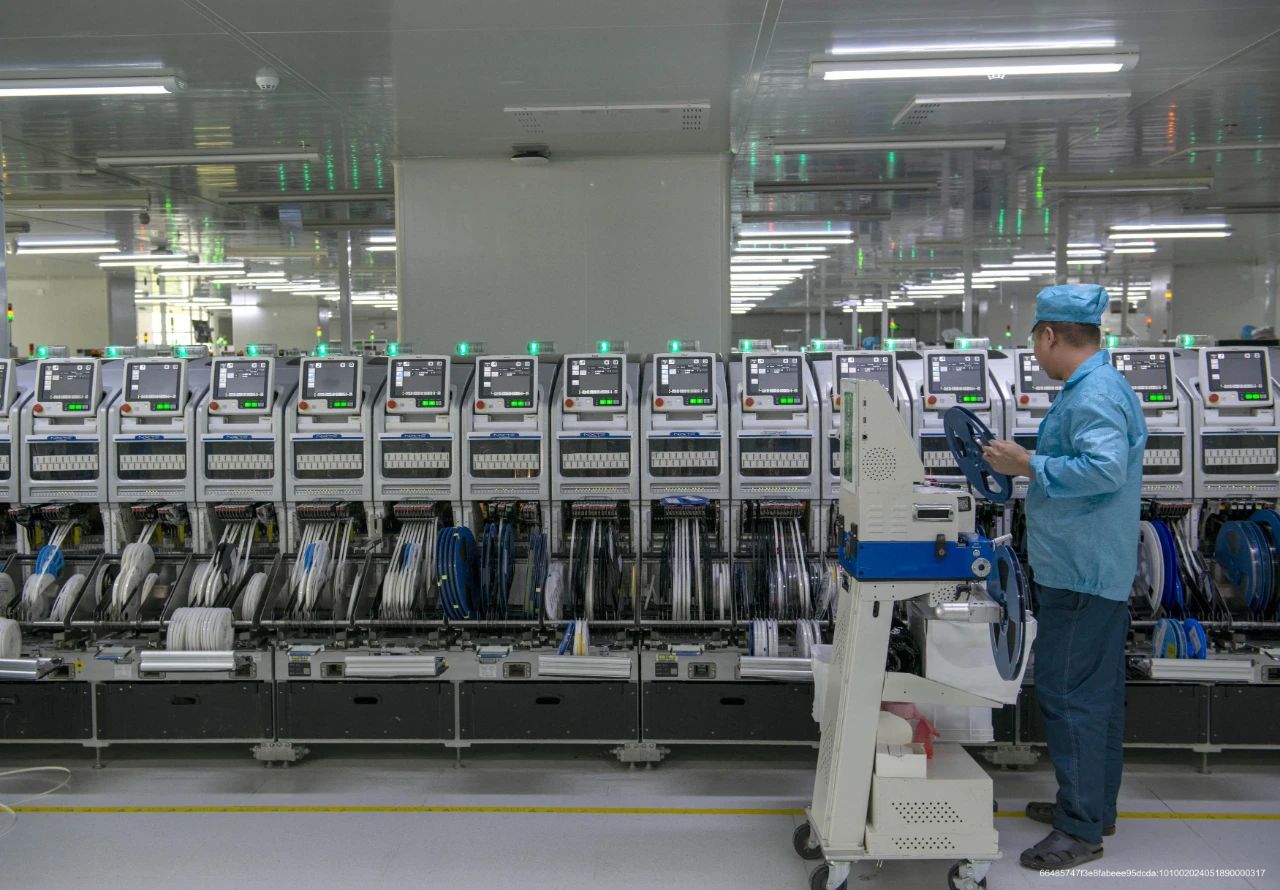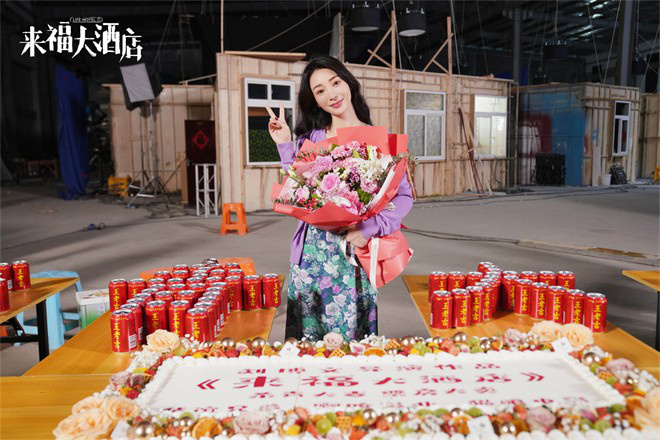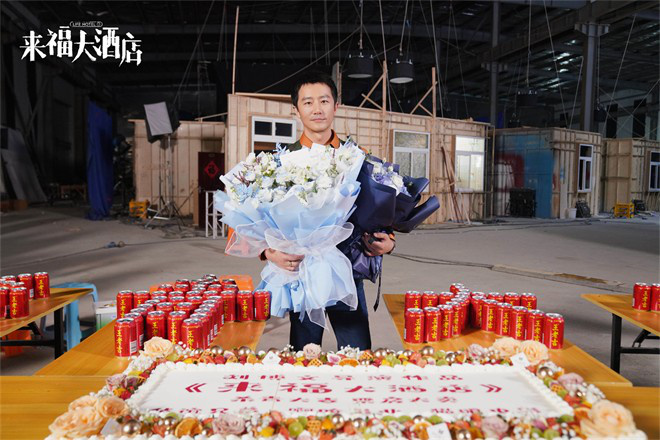
Fanghua, blooming in the sun; Women, show the style of the times.
Since the 18th National Congress of the Communist Party of China, the CPC Central Committee with the Supreme Leader as the core has been concerned about the all-round development of women, planning and deploying to promote women’s work, and encouraging hundreds of millions of women to hold their heads high, struggle and dream on the new journey of realizing the great rejuvenation of the Chinese nation.

"The cause of women has always been an important part of the cause of the party and the people."
On February 25, 2021, the Great Hall of the People in Beijing. The national summary and commendation meeting for tackling poverty was grandly held here.
On the podium, General Secretary of the Supreme Leader leaned over and solemnly awarded the medal to Zhang Guimei, who was in a wheelchair.
"Take care of yourself!" The general secretary said with concern.
Despite her illness, Zhang Guimei, the principal of Huaping Girls’ High School in Lijiang, Yunnan Province, has held up more than 2,000 girls’ dreams of studying in mountainous areas with her hands for more than 10 years. The general secretary praised her deeds: "Dedicated to education and poverty alleviation, igniting the hope of Dashan girls".
More than four months later, she used these plastered hands to "hold" the "July 1st Medal" representing the highest honor in the Party.

On the first day of the college entrance examination in 2023, Zhang Guimei, the principal of Huaping Girls’ High School in Lijiang, Yunnan, watched the students enter the exam outside the test center (photo taken on June 7, 2023). Xinhua News Agency reporter Jiang Wenyao photo
In the name of the country, pay tribute to the hero. On the journey of Chinese modernization, the dazzling light of women’s model shines; In the history of the Republic, the outstanding feats of "Half the Sky" are engraved!
"Our party has led the people in the glorious course of unremitting struggle, and every victory has the active participation and outstanding contribution of the majority of women." The words of the General Secretary of the Supreme Leader are profound.
For more than 100 years, in various historical periods of revolution, construction and reform, the Communist Party of China (CPC) has always insisted on writing women’s liberation and development and equality between men and women on its own banner of struggle, always regarded women as an important force to promote the development of the cause of the party and the people, always placed women’s work in an important position, opened up the road for women’s development in Socialism with Chinese characteristics, and led women to write a wonderful chapter of sharing their destiny with the motherland and fighting with the people.
"Women hold up half the sky. How heroic this sentence is! " In the mind of the Supreme Leader’s General Secretary, there is no limit to the strength of women.
On March 8, 1990, the then Supreme Leader of Ningde District Party Committee Secretary published an article entitled "Women are the Great Force to Promote Social Development — — For the "March 8" International Women’s Day.
The article writes, "History and reality tell us that women, who account for more than half of the population, are a great force to promote the development of the whole society. The success of each of our undertakings includes the hard work of women. " Between the lines, full of praise and encouragement to women compatriots.
"Good holidays! You are all very energetic today. "
On March 8, 2013, during the two sessions of the National People’s Congress, General Secretary of the Supreme Leader paid a cordial visit to women representatives when he participated in the deliberation of the Jiangsu delegation, and said to everyone: "Women representatives are the best among women, and I hope you can give full play to the leading role."
In the spring of March, women welcome their own festivals. Since the 18th National Congress of the Communist Party of China, every year at this time, the sincere holiday wishes of the Supreme Leader General Secretary will arrive as scheduled.
General Secretary of the Supreme Leader is very concerned about the development of women’s cause. Based on the present and focusing on the future, the CPC Central Committee with the Supreme Leader as the core has made a series of groundbreaking, overall and long-term major decision-making arrangements:
"Adhere to the basic national policy of equality between men and women and protect the legitimate rights and interests of women and children" was written in the 18th and 19th National Congress of the Communist Party of China and Report to the 20th CPC National Congress;
"Pay attention to the construction of family education style and protect the rights and interests of women and children" was written into the third historical resolution of joining the party;
At the Fourth Plenary Session of the 19th CPC Central Committee, it was clearly put forward that "the system and mechanism for promoting gender equality and women’s all-round development should be adhered to and improved".
… …
On October 31st, 2013, when the General Secretary of the Supreme Leader talked with the new leadership of the All-China Women’s Federation, he pointed out the way forward for the development of women’s cause in the new era — —
"Realizing the goals and tasks put forward by the 18th National Congress of the Communist Party of China and realizing the great rejuvenation of the Chinese nation is the overall work of the Party and the country, and it is also the theme of the times of the contemporary women’s movement in China."
In the new era and new journey, the development of women’s cause has been endowed with new connotation of the times, and hundreds of millions of women shoulder more important missions.
At 23: 57 on November 1, 2018, with the successful launch of the 41st Beidou navigation satellite, thunderous applause sounded in the command hall. Colleagues gave Zhang Runhong thumbs up and praised her.
The sonorous password of this satellite launch was issued by 36-year-old Zhang Runhong. This is the first time in China’s space history that a woman is the commander of "01".
On the eve of the Spring Festival that year, the General Secretary of the Supreme Leader came to a base of the troops stationed in Sichuan to visit the officers and men. Zhang Runhong, who was in the team, reported his ambition to the General Secretary:
"Chairman of the report, I still have a goal, which is to become the first woman in China ‘ 01’ Commander. "
“‘ 01’ Commander, being able to undertake such a heavy scientific research task is also a sign of the cause of women in our country. I also hope that you can achieve your goal as soon as possible. " The general secretary happily encouraged Zhang Runhong.
Women’s heroes struggle to realize their dreams, and the development of women’s career in the new era shows a new atmosphere.

In the "Women’s Workshop" in Fengcang Village, Shendingshan Town, Miluo City, Hunan Province, workers are producing data lines (photo taken on March 7, 2023). Xinhua News Agency reporter Chen Si Khan photo

"We should make unremitting efforts to open up a broad road for the development of women’s cause."
On April 19th, 2007, the supreme leader comrade served as the secretary of Shanghai Municipal Party Committee for less than one month, and made a special trip to Shanghai Women’s Federation for investigation.
"As soon as he entered the conference room, he shook hands with each of us first." Recalling the scene of that year, Zhang Lili, then Party Secretary of Shanghai Women’s Federation, still could not hide her excitement.
"Women hold up half the sky. If we do this half thing well, it will affect the overall situation and the whole." The exhortation of the Supreme Leader made Zhang Lili and other comrades at the meeting feel deeply responsible.
Love is consistent, and feelings are deep and lasting.
Since the 18th National Congress of the Communist Party of China, the General Secretary of the Supreme Leader has profoundly pointed out: "Doing a good job in the Party’s women’s work is related to uniting and rallying the broad masses of women who account for half of China’s population, to providing a powerful force for the development of the cause of the Party and the people, and to consolidating the class foundation and mass foundation of the Party’s governance".
From ensuring women’s basic medical and health services to enhancing women’s ability to participate in political and economic activities; From developing vocational education and lifelong education for women to developing international development cooperation in the field of women; From the formulation of the Outline for the Development of Women in China (2021-2030) to the revision of the Law on the Protection of Women’s Rights and Interests … … The CPC Central Committee with the Supreme Leader as the core has always attached importance to women’s all-round development, leading women to release their creative vitality and realize the value of life.
"Domestic service is promising" — — In November 2013, the words made by the Supreme Leader General Secretary during his inspection tour in Jinan Comprehensive Service Center for Migrant Workers strengthened the determination of Zhuo Changli, a domestic worker: "The encouragement of the General Secretary made my heart warm up at once!"

Zhuo Changli (middle) guides the domestic servants who are being trained (photo taken on June 2, 2021). Xinhua news agency
Care turns into motivation, and expectation inspires action.
Today, Zhuo Changli founded the "Sunshine Sister" housekeeping service company from Jinan to the whole country, and the number of domestic attendants has grown to more than 70,000. Zhuo Changli and his sisters also changed their destiny and realized their value in the process of serving the society.
"In the process of China people’s pursuit of a better life, every woman has the opportunity to shine in life and make her dreams come true." Listening to women’s voices, respecting women’s wishes, and the affectionate entrustment of the Supreme Leader General Secretary give women the confidence and strength to pursue their dreams.
For the training of female cadres, the General Secretary of the Supreme Leader pays special attention to it.
"That meeting was really good, and the care of the supreme leader comrades became the driving force for us to take the road of life well." Thirty years have passed, and Zhu Hua, a retired female cadre, has always been impressed.
In 1993, Fuzhou Women’s Federation held a symposium for female cadres and invited the top leader of Fuzhou Municipal Party Committee Secretary to attend the guidance. Comrade Supreme Leader said at the meeting that women’s participation in politics is a sign of social civilization, women’s liberation and the superiority of the socialist system. Accelerating the training of women cadres is the need of speeding up reform, opening up and economic construction, and it is also an important part of the work of our party organization.
More than 20 female cadres attending the meeting were encouraged, and they successively took up important positions and played a key role through their own efforts.
"The status of women is one of the important symbols to measure the level of civilization in a society. We should understand the characteristics of women cadres and care for them. I hope that women cadres will establish the spirit of self-esteem, self-confidence, self-reliance and self-improvement and boldly carry out their work. "
When talking collectively with the members of the new leadership team of the All-China Women’s Federation, he emphasized "caring for their growth and creating a broad stage for more female talents to stand out"; At the 20th National Congress of the Communist Party of China, it was emphasized that "we should attach importance to the training and selection of female cadres and give full play to their important role" … … Since the 18th National Congress of the Communist Party of China, the General Secretary of the Supreme Leader has encouraged and supported women to participate in the practice of economic and social development and contribute to the construction of a strong country and national rejuvenation.
"Aunt, you are here."
On the eve of the Lunar New Year in 2016, General Secretary of the Supreme Leader who visited Jinggangshan came to Shende Bookstore in Bajiaolou and recognized Gong Quanzhen as soon as he entered the door.
More than two years ago, when meeting with the winners of the Fourth National Moral Model and Nomination Award, General Secretary of the Supreme Leader specially introduced to the participants: This doyen is Gong Quanzhen, the wife of the old general Gan Zuchang. She is over 90 years old this year, and I was deeply moved when I saw her.
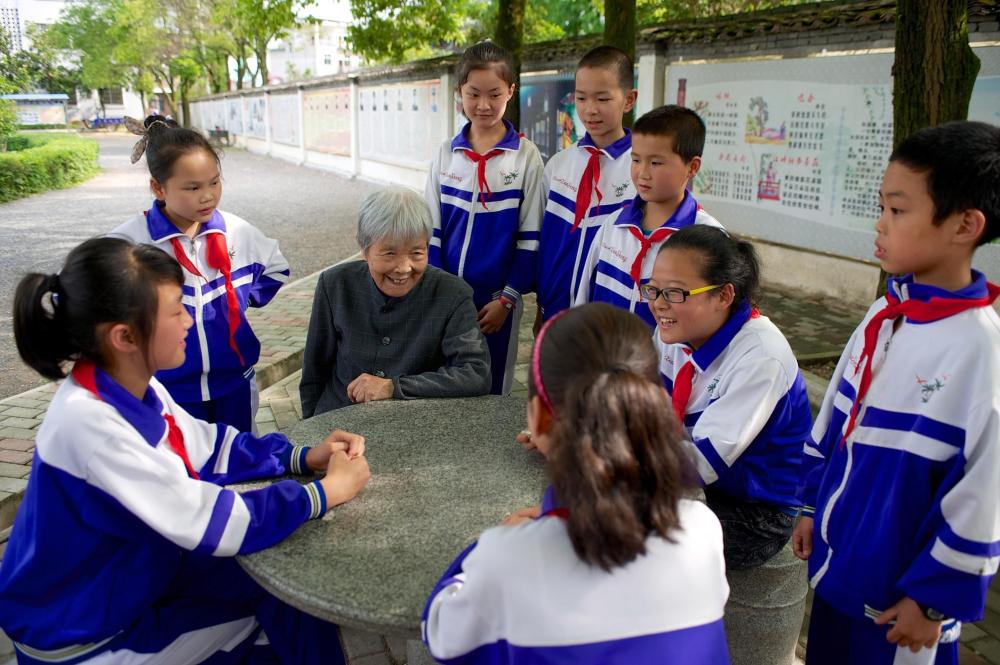
Old man Gong Quanzhen (third from left) and children in Lianhua County, Pingxiang City, Jiangxi Province (photo taken on May 21, 2013). Xinhua News Agency reporter Hu Chenhuan photo
"I had this text when I was a primary school student. The content is that generals are farmers, and we are deeply influenced." General Secretary of the Supreme Leader said that half a century later, Gong Lao still carries forward this spirit, and this spirit of hard struggle should be passed down not only by our generation, but also by the next generation.
Home is the smallest country, and there are thousands of countries.
"Women should play a greater role in society and play a key role in the family." The General Secretary of the Supreme Leader pays special attention to the unique role of women in carrying forward the family virtues of the Chinese nation and establishing a good family style, and promotes the harmony of small families to build a harmonious society.
With the tide of the times rolling forward, how can women’s federations continue to be the "parents" of hundreds of millions of women? How to make women’s work always new and full of vitality?
In July 2015, the General Secretary of the Supreme Leader presided over the first meeting of the Central Party’s group work in the history of the Party, which opened the curtain of deepening the reform of the Women’s Federation. A year later, the All-China Women’s Federation Reform Plan was issued, and a series of major measures continuously enhanced the political, advanced and mass nature of women’s federations, so that "parents" could speak out when women needed it, defend their rights, and sink into service, and do more practical and good things for women.
The "Women’s Grand Presentation" covered more than 1.5 billion person-times online and offline, and more than 4,000 national March 8th Red Flag Bearers and a large number of advanced typical transmission role models;
1.08 million women’s groups and 900,000 "women’s homes" and "women’s micro-homes" are distributed in urban and rural communities; Nearly 7 million executive committees of women’s federations at all levels are active at the grassroots level and serve the majority of women;
Government cadres regularly go to the grassroots level and go to households to solve practical difficulties for women; The online women’s Federation has been upgraded and developed to create an "online home" for women who are not disconnected for 24 hours;
… …
"We should make unremitting efforts to open up a broad road for the development of women’s cause" — — The solemn commitment made by the CPC Central Committee with the Supreme Leader as the core is constantly becoming a beautiful reality.

"Every woman is a writer of the times and a struggler for dreams."
The outbreak in COVID-19 was sudden. Liu Jiayi, a "post-00" female nurse of Guangdong medical aid team, plunged into Wuhan in the "storm". She said, "If I wear protective clothing, I won’t be a child."
This sentence touched China and the world. On October 1, 2020, General Secretary of the Supreme Leader told the world the story of this female nurse at the high-level meeting of the United Nations General Assembly to commemorate the 25th anniversary of the Beijing World Conference on Women — —
"It is thousands of such women in China, dressed in white and retrograde, who have interpreted the kindness of doctors with courage and hard work, and exchanged their responsibility and dedication for the innocent mountains and rivers."
State affairs, China women have never been absent. At the critical juncture of fighting the COVID-19 epidemic, in the fiery front line of poverty alleviation and rural revitalization, in the forefront of scientific research … … The vast number of women are selfless, fearless and willing to contribute, and have written magnificent women’s chapters.
Be a builder of great cause, serve the country and the people, and shine — —
On July 21st, 2021, General Secretary of the Supreme Leader met Huang Haifen, a post-90s female village official, at the convenience service center in Gala Village, Linzhi City, Xizang.
Knowing that the Chaoshan girl gave up her white-collar job after graduating from college and settled down in the snowy plateau, the General Secretary of the Supreme Leader encouraged her: "From the coast to the plateau, you need people here. Do a good job here."
Entrust earnestly, such as spring breeze blowing through the heart. Huang Haifen has no regrets and is determined to spend his youth where the party and the people need it most.
On September 11th, 2020, at the symposium of scientists, Fu Qiaomei, a female scientist born after 80s who has been engaged in paleogenetics research for a long time, admitted to the General Secretary: "People often ask, ‘ What’s the use of your research ’ . When it was difficult to maintain in the laboratory, I also thought about whether to do a popular research … …”
After listening to it, the general secretary said with deep feelings: "What do you think of the unpopular? Generally speaking, some unpopular things are useless. This understanding may delay the career in a field. To evaluate scientific research, we must have a long-term vision, a world vision and a scientific vision. "
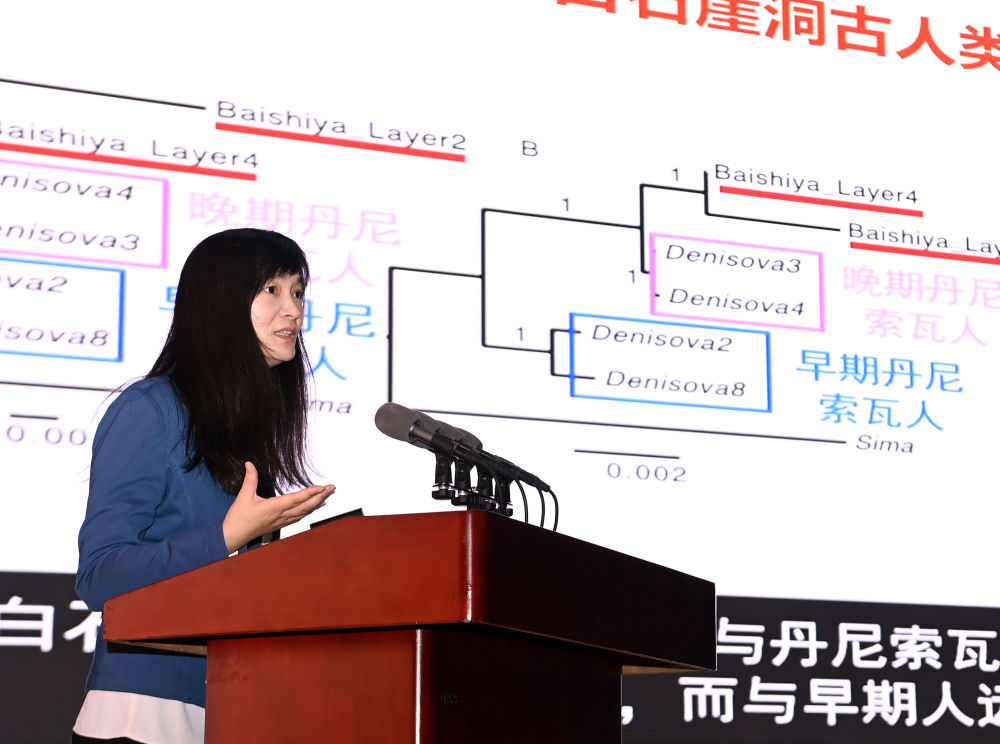
Fu Qiaomei, a "post-80s" female scientist who has been engaged in paleogenetics research for a long time, gave a keynote speech at the 3rd China Archaeological Congress held in Sanmenxia City, Henan Province (photo taken on October 18th, 2021). Xinhua News Agency reporter Li Heshe
Bearing in mind the encouragement of the General Secretary, Fu Qiaomei sat on the "cold bench" and led the team to continue to study in the field of paleogenome research.
The individual "ego" is integrated into the "ego" of the party and the country, and the majority of women are self-reliant and forge ahead, contributing wisdom and strength to the development of various undertakings in the country.

Women volunteers from Huyuan Township, Fuyang District, Hangzhou City, Zhejiang Province, promoted local specialty foods and agricultural products at the rural market (photo taken on March 3, 2023). Xinhua News Agency reporter Xu Yushe
Be an advocate of civilized fashion, carry on the tradition and carry forward the virtues — —
On the morning of June 29th, 2021, at the Great Hall of the People in Beijing, the Party Central Committee awarded the "July 1st Medal" for the first time.
"Wang Lanhua, there you go again, again with honor." General Secretary of the Supreme Leader greeted the old man whom he had seen during his visit to Ningxia the year before.
Wang Lanhua, who is over 70 years old, is a volunteer leader of Jin garden club in wuzhong, Ningxia, and is called "Living Lei Feng" in the community. She said that when encountering difficulties, she often thinks of what the General Secretary said: "Socialism is done".
From the "Wang Lanhua Enthusiastic Group" with only seven people to the volunteer team with over 95,000 people, Wang Lanhua, who is over 70 years old, led a group of enthusiastic aunts and embarked on an increasingly broad "love avenue".
"Orchid fragrance", actions speak louder than words.
In the early morning, Huawu Village, Qianxi City, Guizhou Province was busy. In the non-legacy workshop, embroidered mothers are flying needles and rushing to make a batch of Miao Xiu clothing orders.
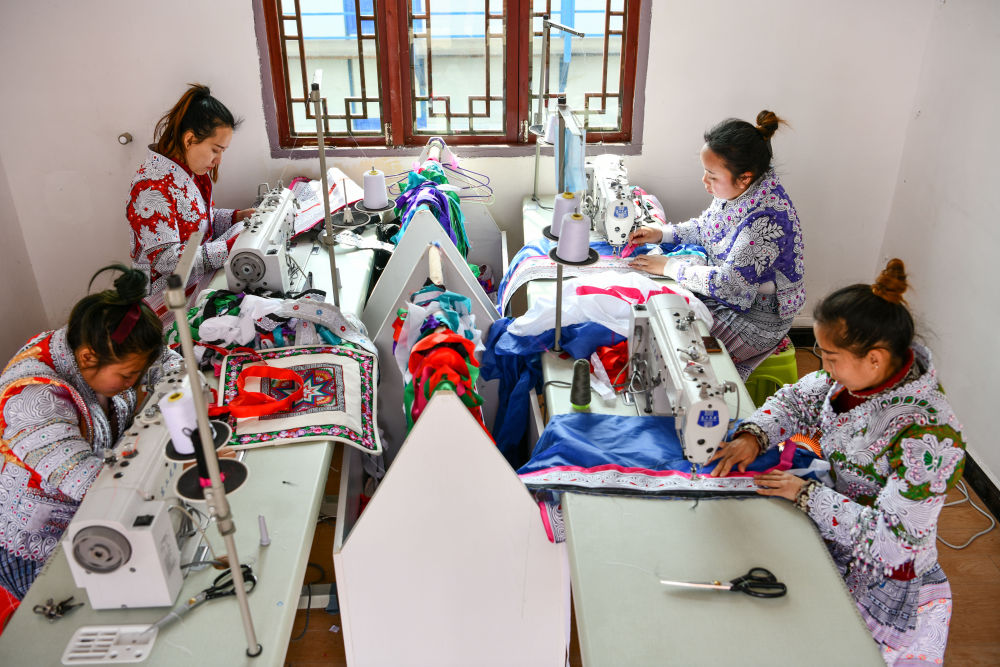
Miao embroidered mothers are making Miao costumes in Huawu Village, Xinren Miao Township, qianxi county, Bijie City, Guizhou Province (photo taken on February 20, 2021). Xinhua News Agency reporter Yang Wenbin photo
On February 3, 2021, General Secretary of the Supreme Leader came to Huawu Village. Peng Yi, a non-genetic inheritor, told the General Secretary about his experience of returning to his hometown to start a business and develop Miao Xiu skills. The general secretary affirmed: "Miao Xiu is both traditional and fashionable. You embroidered it one by one. How wonderful!"
Bearing in mind the general secretary’s encouragement that "Miao Xiu must be carried forward", Peng Yi not only provided a platform for local women to learn Miao Xiu skills, but also actively explored the innovative development of Miao Xiu, so as to rejuvenate ancient Miao Xiu.
Li Jin, Teng Bian, Jia Ya Tibetan Carpet … … In the local investigation and research, the general secretary has had exchanges with many female non-genetic inheritors. Good talk and expectation will inspire women to pass on Chinese excellent traditional culture from generation to generation with confidence.
Be a struggler who dares to pursue dreams, work hard and make progress — —
The 2019 Women’s Volleyball World Cup was held in Japan from September 14 to 29. China women’s volleyball team won the championship and successfully defended its title by winning 11 consecutive victories.
On the occasion of celebrating the 70th birthday of New China, General Secretary of the Supreme Leader specially invited China women’s volleyball team members who just won the championship to attend the National Day reception, and cordially met with women’s volleyball representatives before the meeting. The general secretary praised: "You showed the spirit of the motherland first, unity and cooperation, tenacious struggle and never give up."
On October 7th, 2023, the China Women’s Volleyball Team achieved another success in the Hangzhou Asian Games, winning the gold medal in the Asian Games for the ninth time with a total victory of six games.

On October 7th, 2023, the China Women’s Volleyball Team achieved another success in the Hangzhou Asian Games, winning the gold medal in the Asian Games for the ninth time with a total victory of six games. Xinhua News Agency reporter Zhang Tao photo
Enthusiastic words, earnest entrustment, inspire women’s volleyball girls to dominate the arena, inspire hundreds of millions of women to forge ahead and dream of rejuvenation with the most beautiful posture.
In 2012, Liu Yang embarked on a flying journey, and women in China wandered the vast universe for the first time.
"You are a heroine, and a representative of women who hold up half the sky. Now you have become the ‘ of women in China; Image ambassador ’ !” During the two sessions of the National People’s Congress in 2013, General Secretary of the Supreme Leader cordially praised Liu Yang.

The return capsule of Shenzhou-9 spacecraft successfully landed in the reserved area of the main landing site in central Inner Mongolia, and astronaut Liu Yang got out safely (photo taken on June 29th, 2012). Xinhua News Agency reporter Wang Jianmin photo
"We are lucky to catch up with the good times of national development, and we will definitely write the honor of our motherland all over space!" Liu Yang said firmly.
Ten years passed, and Liu Yang devoted himself to preparing for the war. In 2022, she knocked on the sky again with the Shenzhou 14 manned spacecraft.
The sea is wide and the fish jumps, and the sky is high and birds fly.
"On the new journey, every woman is a writer of the times and a struggler who pursues dreams. It is necessary to unite the strength of women, gather the wisdom of women, respect and care for women, guide women to actively participate in the great practice of the new era and new journey, and make new and greater contributions to building a socialist modern country in an all-round way and promoting the great rejuvenation of the Chinese nation in an all-round way. "
Under the strong leadership of the CPC Central Committee with the Supreme Leader as the core, the vast number of women cherish the beautiful dreams endowed by the great era, and make contributions and continue to write glory in the vast world of the new journey with their lofty sentiments and hard work.

Text reporters: Huang Yue, Dong Boting, Wang Mingyu.
Poster design: Xie Yue
Editor: Wang Qiuyun, Yang Wenrong, Zhang Huihui, Hao Xiaojing, Qi Wenjuan, Wang Haocheng, Wu Jinfu
Coordinator: He Yuxin and Zhou Yongyan
